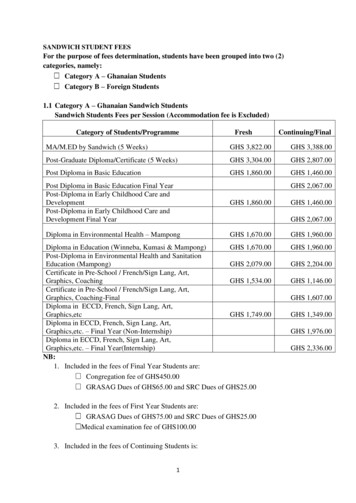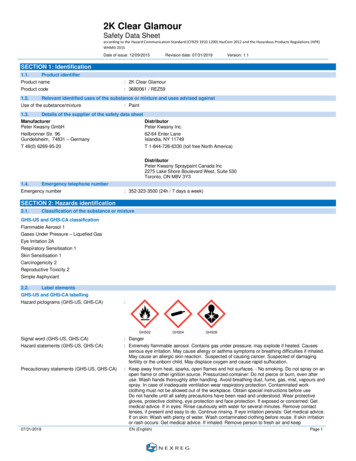
Transcription
Research Project for GHS(length: 2 to 4 pages, written by the candidate; minimum font size: 11pt)NameProject TitleBackground (max 1 page)Competency-based medical education attracts worldwide interest and influence at the under- and postgraduate level.In Canada, the CanMEDS, a competency-based medical education (CBME) framework was introduced and since then,educators in many countries, have started to develop, implement and assess competency-based curricula (O'Dowd etal., 2019, Meyer et al., 2019, Sottas, 2011). Core aspects of competencies can be operationalized as entrustableprofessional activities (EPAs) (Carraccio et al., 2017). EPAs translate competencies to observable clinical activities. EPAscan be defined as an activity that is entrusted to a trainee without direct supervision once the trainee hasdemonstrated the competencies to do so (ten Cate, 2005). Another important element in this context are entrustmentsupervision scales: They define a range of entrustment levels in order to indicate, whether residents can perform aclinical task (such as an EPA) e.g. under close, distant or without any supervision. The entrustment decision is made bya supervisor and contains the decision, under what kind of supervision the trainee is allowed to perform the clinicaltask (Ten Cate et al., 2020).On the undergraduate level, the national curriculum „PROFILES“ has been introduced in Switzerland. PROFILES definesnine different EPAs that should be taught and learned during medical school (Michaud et al., 2016). The goal for allmedical students who start their residency training is to be able to perform the defined clinical activities under indirectsupervision. On the graduate level, the catalogue of learning objectives for residency training in Switzerland has beendevelopped on the basis of the CanMEDS framework (SIFW, 2020). In contrast to undergraduate training, postgraduatecurricula are still at the beginning of developing and introducing EPAs. So far, postgraduate EPAs have been developedonly for a few different specialities in Switzerland. Concerning the speciality field of psychiatry, the Royal Australianand New Zealand College of Psychiatrists (RANZCP) structured the whole residency training for psychiatry andpsychotherapy based on EPAs. Canadian educators have started to develop EPA guides for psychiatry. Theimplementation of EPAs in the Swiss postgraduate training in psychiatry has been recommended by specialty workinggroups and brings a chance to improve residency training and ultimately patient care(Pinilla et al., in press) - this includes all speciality fields in psychiatry such as old age psychiatry.The purpose of this research project is to investigate needs and requirements for an EPA-based curriculum, to identifya set of EPAs specificially for old age psychiatry and to develop assessment methods of some of the identified EPAs.With the proposed studies, we expect to have a foundation to further develop a curriculum for residency training in oldage psychiatry in terms of residents’ achievement of learning outcomes, improving patient safety and patient carequality.Hypothesis & AimsStudy 1: Identifying needs and challenges of residency training in old age psychiatry with implicatons for patient safetyand physician well-being– a mixed method study (survey and interview study)The first study has the aim to explore the current state of residency training in old age psychiatry in order tounderstand the specific needs of the residents and gain insights for required curriculum development. This study alsoaims for a more detailed look into previously known difficulties (less structured residency training, heterogeneity inspeciality training of residents (Buddeberg-Fischer et al., 2010) and different backgrounds of undergraduate training ofresidents (Hudelson, 2006)). We plan to investigate how entrustment decisions are made at present. Research in othereducational systems suggests that residents can feel overentrusted and this could possibly influence patient safety andquality of care (Yardley et al., 2020, Karp et al., 2019). Our aim is to gain insights in this phenomen by betterunderstanding what the challenges are in current residency training in Switzerland and what is needed for the furtherdevelopment of the residency curriculum. This study will also provide implicatons for physician well being and patientsafety.GHS Research ProjectPage 1/5
Research Question: How do current residents in old age psychiatry in Switzerland perceive the beginning of theirclinical rotation regarding their prepardness, entrustment decisions and curricular support?Study 2: Developing EPAs for old age psychiatry in Switzerland – a Delphi studyThe goal of this second study is to develop and identify several end-of-training EPAs with a Delphi process for old agepsychiatry that build the core for a competency-based residency program.Research questions: Which EPA should residents in old age psychiatry be able to perform on an indirect supervisionlevel at the end of the clinical rotation in old age psychiatry? Aim: Establishing consensus for a set of validatedentrustable professional activities in old age psychiatry.Study 3: Implementing clinical teaching and assessments for a pilot EPA in old age psychiatry: a mixed-methods studyThe aim of this study is to implement and assess a pilot EPA established in Study 2 regarding clinical teaching and thecorresponding workplace-based assessments.Research Question: How do targeted clinical teaching activities and assessment of an EPA in old age psychiatryresidency training affect resident’s feelings of preparedness, their supervison levels and resulting entrustmentdecisions? Hypothesis: Systematic teaching activities and targeted assessment of an EPA does improve resident’sfeelings of preparedness, support self-regulated learning behaviour and informs entrustment decisions and supervisionlevels.Methodology & Research Plan (Specify the criteria for selection of patients/volunteers, give detailedinformation on evaluation strategy and the models/paradigms that will be used.)Study 1: The first step in the development of a competency-based curriculum is a needs assessment (Frank et al.,2007). We chose a mixed-methods approach and intend to combine an online questionnaire and semi-structured indepth interviews. Starting with the online questionnaire, we will invite residents who are currently in a rotation in oldage psychiatry to participate in a nationwide survey and explore salient findings through in depth interviews. Surveyand interview questions will be developed based on relevant literature in the context of competency-based medicaleducation (CBME) (Frank et al., 2010) and state of the art survey design guidelines (Artino et al., 2014). Properunderstanding of the questions (“response process”) will be investigated in form of a think alound pilot study withresidents from the university psychiatry hospital in Berne (UPD). Narrative responses to a subset of survey questionsand in-depth interviews will be analysed using thematic content analysis (Braun et al., 2006).Study 2: In order to develop a validated set of EPAs for old age psychiatry, the Delphi method will be applied, toestablish consensus. It is based on a multistaged, several rounds long procedure in which experts’ opinions areiteratively soliceted until consensus is reached (Linstone et al.,1975). In order to have an initial draft, literature,including grey literature, will be reviewed. In conformity with a previous study on end-of -training EPAs for psychiatryin the US, the initial drafts will be reviewed by staff that is familiar with EPAs in order to meet quality criteria (Young etal., 2018). They include having a clearly defined beginning and end, being specific and focused, observable in processand measurable in outcome (Taylor et al., 2017). The next step will be the actual start of the Delphi study with multiplerounds of experts in old age psychiatry in Switzerland (recruited with support from the Swiss Society of Old AgePsychiatry, SGAP) who will be introduced and informed about the construct of EPAs and will rate the initial drafts. Inthe first round, we plan to give experts the chance to rate EPAs regarding their relevance and to suggest changes to thetitle and descripton and to submit additional comments. This includes to propose EPAs that out of their perspective aremissing or to eliminate irrelevant EPAs. In the second round the revised EPAs will be re-rated on relevance and writtenfeedback can be submitted. This will lead to a national consented set of EPAs for old age psychiatry in Switzerland.Study 3: This study will take target residents and other health care workers from the University Hospital of Old AgePsychiatry and Psychotherapy at the University of Bern. The underlying theory and paradigm is again rooted in theliterature of CBME and EPAs. We assume, that a potential old age psychiatry EPA such as “Managing acutely agitatedand psychotic geriatric patients” will be a required EPA (as to be confirmed in Study 2) and qualifies as a complex andrelevant clinical activity. Teaching and assessment activities including preparation with literature and video examplesfor simulated scenarios with simulated patients(actors) will be conducted (Kollewe et al., 2018). The training and assessment sessions will be filmed and reviewed bymultiple supervisors. In order to gain knowledge on how residents, supervisors and other members of the healthcareteam perceive the specific training and assessments on a single EPA, interviews will be conducted after these sessions.These interview data will be analysed based on a thematic content analysis approach (Braun et al., 2006). Further, theGHS Research ProjectPage 2/5
video material on residents’ performance with simulated patients will be rated through several supervisors based onan entrustment-supervision scale.Possible PitfallsThe collection of data and analyses might take longer than planed (e.g. the responses in the Delphi-process may comedelayed; the coordination and response time of the survey may take longer). Through the support of the associationof psychiatrists in Switzerland (SGPP) we hope to achieve a sufficient response rate.Timetable (important, graphic representation of the tasks of the whole PhD to be evaluated on a yearlybasis)NOTE: doctoral students for FKIII (PhD in Clinical Sciences) should also clearly indicate the respective timeperiods of clinical and research practice.Example:Collaborators (Who is doing what?)your specific tasks as PhDName, role (thesis advisor) and tasksName role (co- thesis advisor) and tasksName role (co- referee) and tasksName role ( .) and tasksName role ( .) and tasksPublications plan (specify where you will be first author and check our tions/index eng.html)References- Artino, A. R., JR., La Rochelle, J. S., Dezee, K. J. & Gehlbach, H. 2014. Developing questionnaires for educationalresearch: AMEE Guide No. 87. Med Teach, 36, 463-74.- Buddeberg-Fischer R, B., Stamm, M. & Klaghofer, R. 2010. Career paths in physicians' postgraduate training aneightyearGHS Research ProjectPage 3/5
follow-up study. Swiss Med Wkly, 140, w13056.- Braun, V. and Clarke, V. (2006) Using thematic analysis in psychology. Qualitative Research in Psychology, 3 (2). pp.77-101. ISSN 1478-0887 Available from: http://eprints.uwe.ac.uk/11735- Carraccio, C., Englander, R., Gilhooley, J., Mink, R., Hofkosh, D., Barone, M. A. & Holmboe, E. S. 2017. Building aFramework of Entrustable Professional Activities, Supported by Competencies and Milestones, to Bridge theEducational Continuum. Acad Med, 92, 324-330.- Frank, J. R. & Danoff, D. 2007. The CanMEDS initiative: implementing an outcomes-based framework of physiciancompetencies. Med Teach, 29, 642-7.- Frank, J. R., Snell, L. S., Cate, O. T., Holmboe, E. S., Carraccio, C., Swing, S. R., Harris, P., Glasgow, N. J., Campbell, C.,Dath, D., Harden, R. M., Iobst, W., Long, D. M., Mungroo, R., Richardson, D. L., Sherbino, J., Silver, I., Taber, S., Talbot,M. & Harris, K. A. 2010. Competency-based medical education: theory to practice. Med Teach, 32, 638-45.- Holmboe, E. S., Sherbino, J., Englander, R., Snell, L., Frank, J. R. & Collaborators, I. 2017. A call to action: Thecontroversy of and rationale for competency-based medical education. Med Teach, 39, 574-581.- Hudelson, P. 2006. Contextualizing cultural competence training of residents: results of a formative research study inGeneva, Switzerland. Med Teach, 28, 465-71.- Karp, N. C., Hauer, K. E. & Sheu, L. 2019. Trusted to Learn: a Qualitative Study of Clerkship Students' Perspectives onTrust in the Clinical Learning Environment. J Gen Intern Med, 34, 662-668.- Kollewe, T., Sennekamp, M. & Ochsendorf, F. 2018. Medizindidaktik. Springer, Berlin, Heidelberg.- Mayring, P. 2004. Qualitative Content Analysis In: FLICK, U., KARDOFF, E. V. & STEINKE, I. (eds.) A Companion toQualitative Research- Meyer, E. G., Chen, H. C., Uijtdehaage, S., Durning, S. J. & Maggio, L. A. 2019. Scoping Review of EntrustableProfessional Activities in Undergraduate Medical Education. Acad Med, 94, 1040-1049.- Michaud, P. A., Jucker-Kupper, P. & THE PROFILES WORKING, G. 2016. The "Profiles" document: a modern revision ofthe objectives of undergraduate medical studies in Switzerland. Swiss Med Wkly, 146, w14270.- O'Dowd, E., Lydon, S., O'Connor, P., Madden, C. & Byrne, D. 2019. A systematic review of 7 years of research onentrustable professional activities in graduate medical education, 2011-2018. Med Educ, 53, 234-249.- Pinilla, S., Matthes, O., Gehret, A., Huwendiek, S., Lenouvel, E., Lindert, S., Marty, A. P., Nick, B., Nissen, C.,Schneeberger, A., Stocker, L., Wallies, M., Weidt, S., Weiss-Breckwoldt, A. & Klöppel, S. 2020. Entrustable ProfessionalActivities in der psychiatrischen Weiterbildung: Ein Konzept für die Zukunft der Schweizerischen Weiterbildung zumFacharzt Psychiatrie und Psychotherapie? Manuscript submitted for publication.- Shorey, S., Lau, T. C., Lau, S. T., & Ang, E. (2019). Entrustable professional activities in health care education: a scopingreview. Medical education, 53(8), 766-777.- SIFW. 2020. Schweizerisches Institut für ärztliche Fort- und Weiterbildung Lernzielkatalog 2020 [Online]. Available:https://www.siwf.ch/files/pdf17/allg lz d.pdf [cited 2020 September 10th].- SIWF. 2019. Leitlinie zur Implementierung von Entrustable Professional Activities (EPAs) in dieWeiterbildungsprogramme [Online]. Available: https://www.siwf.ch/files/pdf7/epa leitlinie d.pdf] [cited 2020October 10th].- Taylor, D. R., Park, Y. S., Egan, R., Chan, M. K., Karpinski, J., Touchie, C., Snell, L. S. & Tekian, A. 2017. EQual, a NovelRubric to Evaluate Entrustable Professional Activities for Quality and Structure. Acad Med, 92, S110-S117.- ten Cate, O. 2005. Entrustability of professional activities and competency-based training. Med Educ, 39, 1176-7.- ten Cate, O., Chen, H. C., Hoff, R. G., Peters, H., Bok, H. & Van der Schaaf, M. 2015. Curriculum development for theworkplace using Entrustable Professional Activities (EPAs): AMEE Guide No. 99. Med Teach, 37, 983-1002.- ten Cate, O., Schwartz, A. & Chen, H. C. 2020. Assessing Trainees and Making Entrustment Decisions: On the Natureand Use of Entrustment-Supervision Scales. Acad Med.Yardley, S., Kinston, R., Lefroy, J., Gay, S. & McKinley, R. K. 2020. 'What do we do, doctor?' Transitions of identity andresponsibility: a narrative analysis. Adv Health Sci Educ Theory Pract, 25, 825-843.- Young, J. Q., Hasser, C., Hung, E. K., Kusz, M., O’Sullivan, P. S., Stewart, C., Weiss, A. & Williams, N. 2018. DevelopingEnd-of-Training Entrustable Professional Activities for Psychiatry: Results and Methodological Lessons. Acad Med, 93,1048-1054.Application to Ethics CommitteeGHS Research Project Not applicableApplicablePage 4/5
If applicable:GHS Research Project SubmittedApprovedPage 5/5
GHS Research Project Page 1/5 . Research Project for GHS (length: 2 to 4 pages, written by the candidate; minimum font size: 11pt) . Background (max 1 page) Competency-based medical education attracts worldwide interest and influence at the under- and postgraduate level. In Canada, the CanMEDS, a competency-based medical education (CBME .










